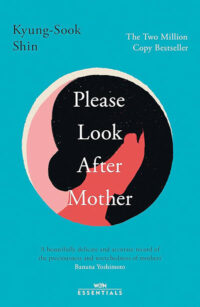Book review: Please Look After Mother by Shin Kyung-sook

Last year I looked up recommendations of Korean literature available in translation. Not so long ago, the options were fairly few but that’s changing fast. I have multiple novels by Kyung-sook Chin on my want-to-read list and I’m happy to find I really enjoyed the first one I tried, Please Look After Mother (translated from Korean by Kim Chi-young).
The premise is simple. But the psychology and emotions are far from simple. An elderly woman, Park So-nyo, is separated from her husband in the busy crowds at a central Seoul subway station. The novel follows her family’s search for her and their gradual discoveries about this woman they thought they knew.
Chapters are told from the perspective of different members of the family in turn. Some sections are written in second person, which I don’t always get on with. And it did put me off a little to begin with, but Chin won me over.
The book opens one week after So-nyo – or Mother, as she is invariably referred to in the book – disappeared. Her husband and five adult children are putting together a flyer with a photo, a few details about So-nyo, and a phone number people can call if they have seen her. Right off the bat, the basic facts of So-nyo are debated and long-buried truths revealed.
The adult siblings squabble and both deeply know and grievously misconstrue each other in painfully realistic ways. They all carry guilt and regret, though not necessarily about things they can help or that would have made any difference.
“Mother always called it his dream, but he hadn’t understood that it had been Mother’s dream too. He only thought of it as a youthful dream that couldn’t be achieved; it never occurred to him that he had deflated Mother’s aspirations as well. He realises that Mother has lived her entire life thinking that she was the one who held him back from his dream. ‘I’m sorry Mother, I didn’t keep my promise.’ His heart brims with the desire to do nothing but look after Mother when she’s found.”
The oldest child, Hyong-chol, has always felt a responsibility to earn money, to provide the material things his family didn’t have when they were growing up. He doesn’t see that success could mean more than a good salary. The third child is a novelist who has achieved some small fame. She has spent years being berated for remaining single, for travelling the world on book tours or writing retreats rather than staying near her family. But she is also a source of pride for a family that came from relative poverty in a small village.
Inevitably a lot of the facts that are revealed are sad – either directly so, or in context. If only these family members had talked more, they might have avoided some of their troubles. But the novel as a whole isn’t overwhelmingly sad, it’s beautiful.
O’mma rul put’ak hae published 2008 by Changbi Publishers.
This translation published 2011 by Weidenfeld & Nicolson.
Source: birthday present from family.